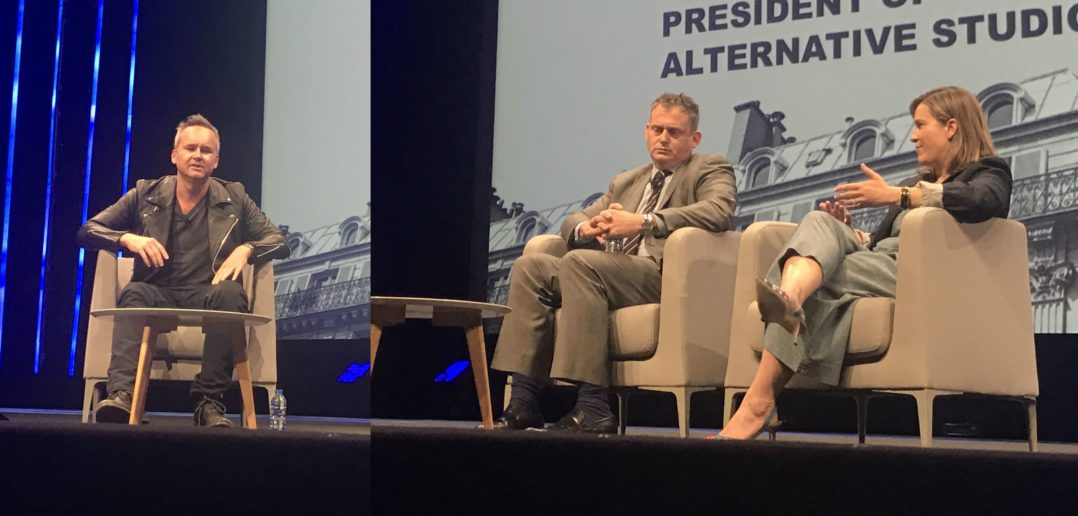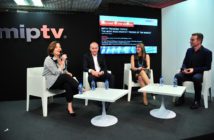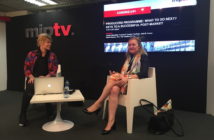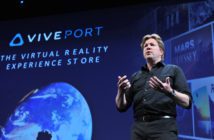The worlds of new and traditional media giants collided at MIPTV this afternoon, with back-to-back keynotes from Amazon Studios and NBC Entertainment. Each saw the company in question give their views on how the television industry is evolving in a multi-platform world.
First to speak was Roy Price, VP of Amazon Studios, which is now making original shows and films for more than 200 countries and territories. His keynote included a sit-down interview with Scott Roxborough, Europe bureau chief of The Hollywood Reporter.
Amazon is often compared to Netflix, but they’re different entities, noted Roxborough. What makes Amazon different? « Part of it is Prime, which is a broader program in general than just the video part, » said Price. « It grew by over 20 million subscribers in 2016. » And that has fuelled Amazon Prime Video’s growth around the world, as Amazon takes Prime to new markets, but also its video service to territories where Prime isn’t available yet.
The conversation moved on to The Grand Tour, which is rumoured to have been a hugely-expensive commission. « The Grand Tour is an expensive show, but it’s well worth it. It’s actually efficient and good economics. In the subscription video-on-demand business, the thing that is going to make the most difference is the show that people are talking about, and that they’re compelled to see, » said Price.

« Grand Tour brings all of that. On Prime Video, pretty much all around the world, the top two shows are The Grand Tour and The Man In The High Castle. Those shows are bringing in new customers and keeping customers… At the end of the day the most important thing is to get artists absolutely at the top of their game, and who are inspired and in their moment… That’s what we focus on, and I think we’ve got an amazing group of artists who are creating great work. »
Now Amazon’s video service is global, has that changed the kind of stories it’s looking for? « You have a base coat of international global shows like The Man in the High Castle or The Grand Tour. But while you can have a global service, our customers are not global customers. They’re local. So you have to pursue a multi-local strategy where you are seeking out the best artists in each territory… That’s going to be a big effort over the next period of time. We have done 20 shows in Japan. » Amazon is growing its teams in India, Tokyo and London to become hubs to lead this international effort.
« It’s a big focus… international originals are going to be very interesting over the next couple of years, » said Price. How will the balance between originals and acquisitions going to shift? « That’s a good question that I’m not going to answer! » smiled Price. « At the end of the day, we’re not going to develop every single one of the best shows in the world, particularly when your real focus is the creme de la creme: the top five or ten shows that everybody is talking about over lunch. Some of them are going to come from other people… Our priority is getting the best show, and what the deal is, whether we invented it or it’s a licence or a coproduction is pretty secondary. »
What are the trends among Prime Video viewers around the world? « It’s a real mix… There’s a lot of focus on TV, but people watch a lot of movies… and I would say top of the totem poles is your original exclusives, which really lead the way, » said Price.
« I really think it’s a new era in television. A new day has dawned. When you’re in this hyper-competitive world of hundreds of thousands of shows, and you really care about the top 10 shows, you’ve got to go for it big-time, » he continued.
« You’ve got to get people who are going to do things differently and bring something really fresh to it. You’ve got to look at everybody: film people, TV people. We think of it as being different from traditional television. We call it ‘filmavision’ – it’s television, but it should really strive to be bigger and better. Bigger doesn’t have to be dragons and spaceships, although it can be. Maybe it’s being more real and contemporary and moving and fresh… It’s an inspiring global creative challenge. »
Amazon still puts its original films into cinemas, partly to ensure viewers do get the opportunity to see them on the biggest possible screen. Filmmakers, too, want people to be able to « see their film as intended… whatever you may predict about what’s going to happen six or seven years from now, theatres play an important role in the movie ecosystem now, so why not participate in that? »
There is more The Grand Tour, The Man in the High Castle and Transparent to come in 2017, along with other originals. A new show called Jack Ryan is in production, executive-produced by Michael Bay. « We’re in production all over the world now, » said Price. « It’s exciting. It’s gotten to the point where you can’t possibly visit all the sets, so hopefully everybody’s working today! »

The second keynote featured two executives from NBC Entertainment: Paul Telegdy, president of its alternative and reality group, and Meredith Ahr, president of Universal Television Alternative Studio. They sat down with moderator Stewart Clarke, editor of TBI Vision, to talk about the network and studio’s evolving strategy.
« We love great drama, and I think that we hold ourselves to the standard of the best storytelling. We focus on characters and relationships, » said Ahr. « What we have, which we’ve stumbled on with America’s Got Talent, building on that with Ninja Warrior and everything that’s come after… they’re all fundamentally positive, they’re human-first, and they all exhibit their own inherent ingenuity. »
Telegdy talked about international affairs. « We’ve had to be part of a visible and invisible network of information-gathering, looking at ratings and trying to understand the businesses of our brother broadcasters. And through that we’ve had hits, » he said. But the desire to own more of those formats led to the creation of the studio that Ahr now heads.
« Think like owners, not like renters. So think for the long term. And one of the obvious decisions for us was to try to reposition ourselves in the value chain, » he said, referring to NBC’s desire to create more formats of its own, rather than simply license them in.
« We wanted to establish ourselves as a place where great original content formats can come from… You’re nothing without that IP, » added Ahr, who stressed that NBC has also worked hard to attract top-tier talent.
Unscripted is a broad church, so how did NBC decide where to make the balance lie in its formats. « Alternative is what they call it in the States: anything that is not a traditional comedy or drama, » she said. « Seinfeld actually came out of the alternative division: it came out of the ‘Specials’ division at NBC, but it became obviously a massive sitcom in our traditional comedy department. But the way it cam through was through untraditional means. That’s not to say I want to make sitcoms… »
Telegdy talked about NBC’s World of Dance, which offers a new layer to the TV-dancing genre with professionals rather than celebrity amateurs, to get across the nature of the competitive sport. It also works well online as smaller clips. « There are billions of views of dance on YouTube. It is a very robust area digitally, and the show cuts up quite well, » said Ahr.
The conversation turned to talent. « We like having people that are prepared to roll their sleeves up and do the work, » said Telegdy. « There’s a little bit of gut when you meet somebody and are creatively in sync with them, » added Ahr. « There are some real distinct qualities of the people that we creatively work with. They’re not just sticking their name on the project. They’re, as he said, rolling their sleeves up and getting involved to help us crack these formats… The talent isn’t just sticking their face on a poster. They’re diving in to make the show better. »
Talent like Jennifer Lopez and Amy Poehler fit into that, with projects they’re working on with the studio, including Poehler’s The Handmade Project, which focuses on arts and crafts. Does Great British Bake Off, which has been a huge hit in the UK, fit into a similar trend, wondered Clarke.
« I see this as a trend in a way. In a world where there’s a lot of mass-produced items, and indeed the quality of those mass-produced items… my kids’ iPhones are a thing of beauty to them, but it really stops there. I noticed they weren’t that excited about the next new phone because it doesn’t do that much more. So now they’re all into making stuff. Baking! And handicrafts of all kind… Cakes are always made with love, they’re delicious! And Amy’s approach to a crafting competition really felt like it had the Bake Off vibe. »
Is there enough room on the schedules for the Alternative Studios projects to find their way onto TV through the NBC network? « Broadcast television? It’s in rude health. We actually have a demand for new shows, and it’s only finite because there are only so many hours that we program in the way that prime-time is structured, » said Telegdy. « I think it’s inevitable that Meredith is going to be selling to other networks by virtue of good ideas needing the right homes. » Ahr clarified that this may happen first with sales to broadcasters outside the US.

Would a successful show from Ahr’s studio on, say, Fox be seen negatively by the top execs at NBC, though? « Our bosses really count one major metric. They count money as the performance metric. So the businesses that make money are exciting to them. If Meredith is in the process of building a business that makes an exciting amount of money, they won’t mind if it’s on another network, » said Telegdy.
The studio’s development slate is taking time to ramp up. « I have a poster in my office that producers always appreciate when they come in: it says ‘Nothing great is created suddenly’, » said Ahr. « When you’re trying to create things that are familiar yet delight you in a different way, there are a lot of nuances, and a lot of tender loving care needs to be applied to all of these shows! » She added that NBC is « giving shots to people who’ve never developed for a network before », which she described as a « thrilling » process that the studio hopes will generate some truly original ideas.
What about competition in the market from digital players like Amazon and Netflix? « I think that we’re sort of successfully partnering with the new digital age, » said Telegdy. « As far as we’re concerned, what we’re hearing from the advertisers… is no one’s watching commercials anywhere except for on broadcast television… Facebook video’s been huge for our shows. YouTube. They’re our friends in terms of the promotion and creating a return path to the shows and remaining relevant with young audiences. »




